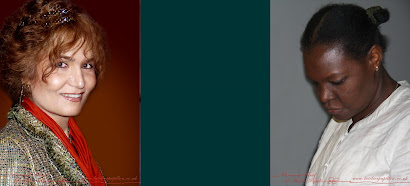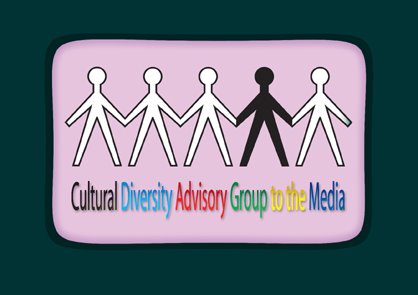 Anver Jeevanjee
Anver JeevanjeeDiversity in the Media, book launch, Southampton 3rd July 2008
Madam Chair, Colleagues and friends - Good afternoon.
I welcome you on behalf of CDAGM to the launch of our ‘Diversity in the Media’. Thank you all for attending.
My very special thanks go to our great regional team, Honorine, Parvaneh and Don for hosting it through the good offices of Southampton Solent University.
You will read more about us in the book, outlining our historical struggle in an attempt to make our media diverse within the mainstream. I believe with a greater sense of pride that we are a unique, diverse, wholly independent, voluntary, self help group who have shunned any public funding - a bit old fashioned in today’s climate and culture yet we are still here after 16 years and enjoy a lot of support from individuals within the media both regionally and nationally. We are still talking with them regularly behind the scenes as we believe in “jaw jaw “rather than “war war”.
The book took a long time to write and collate together. Hence I have almost forgotten what is in it. It was originally over 400 pages but my editor and publisher trimmed it down to less than half its size. I am not sure which half was excised. I must read it sometime.
However, all I need to say about the book is simply this: that it is in line with what Lenny Henry, Samir Shah, Trevor Macdonald, Riz Khan, Henry Bonsu, Shiroma Silva, Moira Stewart, Meera Sayal, Barney Chaudry, Navdip Dhariwal and a very many other well established visible minority role models either working within the British media or externally are saying both privately and publicly. We shall soon hear from Pauline Brandt perhaps of her experiences at BBC South. She has been kind enough to write a foreward to the book and has been wholly supportive, thank you Pauline.
Our institutions of the media in 2008 still continue to remain in-bred by cultural cloning of the existing old boy network.
Not only is there no relative change in past 16 years of our existence but according to those who work within the system, like Lenny, Samir etc., tell us 32 years have gone by without them noticing much.
Andy Burnham, Minister at DCMS told me last week that he is absolutely appalled at the output and portrayal of our regional media and he is determined to change this. But than we have heard this rhetoric before from various former ministers including Chris Smith under whom Andy worked. I reminded him of what Chris Smith the former Minister of DCMS said to us: that he wanted fair portrayal in the front, back and side of the cameras. That still remains a far cry.
In order to address this Andy has now offered to meet my London group every 4 months to assess progress rather than the usual lip service we have endured so far, particularly from the public service media.
I am sorry to be so cynical but I see this as yet another effort at political expediency as I do Harriett Harmon’s proposed bill on equality for women and minorities, as tokenistic and lacking any teeth to enforce it.
As our role models say we are not talking about cleaners, security guys, scene shifters, or anyone wearing a uniform – we are talking about decision makers, producers, directors, and commissioners in the current global context whereby, a black man of Kenyan origin might become the leader of the free world. – therefore, why not a Director General of the BBC. This region in the words of Greg Dyke still remains “hideously white” even for low profile jobs, not to mention portrayal in the mainstream. They have not even bothered to review or acknowledge our book, born out of our local initiative, yet each week we hear white authors receive positive treatment on our public service radio, print or TV.
Despite 30 years of trying, the upper reaches of the media industry, the positions of real creative power, are still controlled by a metropolitan, largely liberal, white, middle class, cultural elite – and, until recently, largely male and of the Oxbridge clan.
I’m also focussing my attention on a specific power-elite or profit orientated individuals who determine what we see and hear on our screens, the print media and our radios.
The so called equal opportunity policies we have followed so assiduously over the last 3 decades simply have not worked. They have produced a forest of initiatives, away days, schemes and action plans and have not resulted in real change.
Our race awareness and now diversity policies carry the excessive baggage of our brutal colonial apartheid heritage. This should have changed now but it has not, except for tick boxing.
It’s not just the visible minorities we should be concerned about. The power-elite in broadcasting excludes not just them but, Irish, Northerners from working class backgrounds, middle England conservatives, people of later years like me, the disabled and many “invisible” minorities like the Europeans seem equally disqualified.
Talented people from here are moving to join the world’s large film and media industries of middle-east, India, China, Africa, USA etc. The European heads of Pepsi and Cocacola are from visible minorities. The financial controller of the BBC is a lady, from my hometown in Kenya, Ms. Zarina Patel and so is the head of IT, but that is where it ends. The vast majority of minorities are in lowly paid menial jobs. The world’s largest steel producer Mital is an Indian and one can go on. Suffice it to say that there is ample talent as regularly demonstrated at the EMMA awards ceremonies, if only media bosses have the foresight to attract them genuinely.
Nevertheless, the tables are fast turning and it may not be long before Beijing and Mumbai bid for our broadcasting / media networks and control them as has happened in many other industries.
Portrayal on our terrestrial channels for which we pay our licence fees will soon become insignificant as most people, particularly our younger generation can already access what they require online or digitally.
I am also rather sceptical of Mark Thompson’s recent offer of technical help to rebroadcast some BBC programmes to its commercial rivals, purely in his quest for avoiding top slicing licence fee income in their favour.
In desperation some sections of the media are suggesting, as I understand it, impose ethnic quotas for the intake of each minority group. This has been tried elsewhere and can only have a negative effect and a back lash just as the government’s current political correctness has – it will not work – it is highly patronising if not illegal. As a group we are not in favour of divisive targeting of programs or recruitment for each of our separate communities. We seek full participation in the mainstream.
Finally, I have some reservations over Lenny’s comical title, “Road to Diversity is closed – seek alternative route”.
I say that we have absolutely no alternative but to strive to make diversity a priority. We have the potential of an existing fine broadcasting service both in the public and private sector that requires a will to go forward, whether that is forced upon us by our own government or external economic power blocks.
Let’s do it now as we have said for many years.
Revitalise or rejuvenate our media leadership and move forward.
Thank you all for listening.




No comments:
Post a Comment